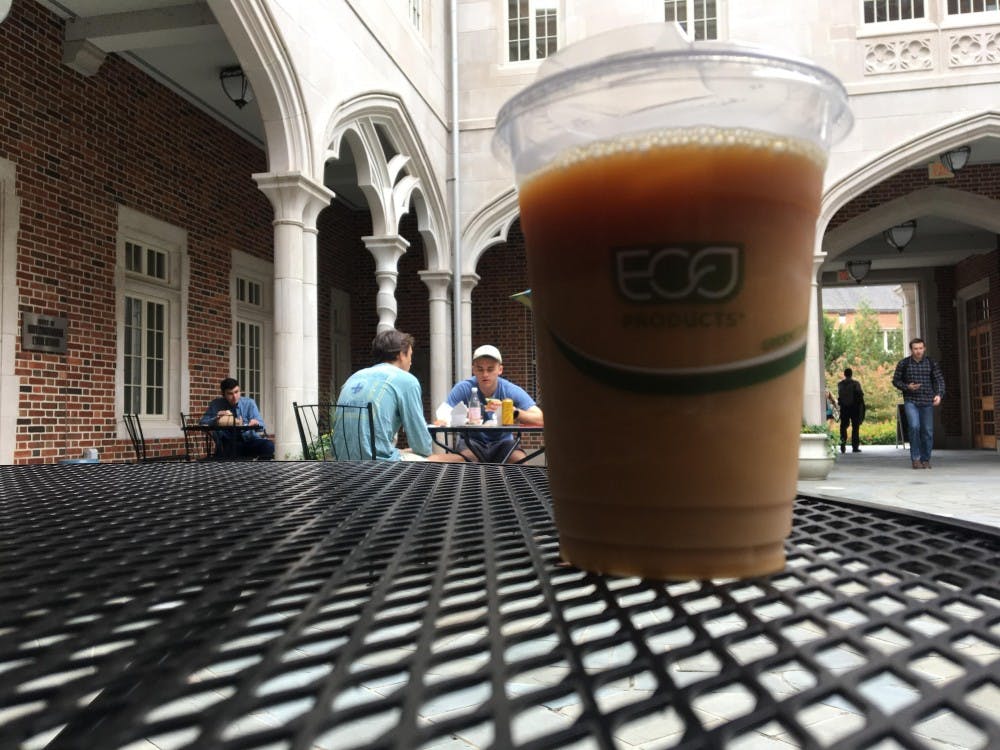University of Richmond’s Office for Sustainability partnered with the E. Claiborne Robins School of Business, Bonner Center for Civic Engagement (CCE) and the Creativity-Innovation-Entrepreneurship Initiative (CIE) to start the Sustainable Solutions Challenge, which was open to all students.
The challenge asks students to come up with a proposal to address a specific sustainable issue on campus. Students have the opportunity to pitch their proposals to panels with both students and administrators.
The topic for this year’s challenge was to address the problems of single-use plastic bottle consumption on campus, according to the challenge's guidelines.
The guidelines outlined the challenge in four stages. Students first had to register their teams of two to four members. The second stage was a five-page written proposal on how the team was going to address plastic bottle consumption on campus.
After review of the proposals, teams would be chosen to advance to preliminary presentations. From the preliminary presentations, three finalist teams will be chosen for a final presentation stage.
The proposals presented will be judged on criteria such as how effective the proposal is in addressing campus plastic bottle consumption, how feasible the implementation is and how convenient it is for customers, according to the challenge's evaluation rubric. The winning team will be granted $500 per team member and have the opportunity to help implement their solution, according to the challenge's guidelines.
Reilly Geritz, a senior and business school major, is the Sustainable Solutions Challenge research assistant and will be on the challenge’s final evaluation panel.
Geritz said Joyce van der Laan Smith, associate dean for undergraduate business programs, created the idea to have the challenge and leads it. The challenge will be held annually, and each year the challenge's topic will change, Geritz said.
In the fall, before the challenge, Geritz and Office for Sustainability Intern Abdul Qadeer Rehan conducted research on plastic bottle consumption as a global, national and campus issue, Gertiz said.
The 30-page research paper Geritz and Rehan wrote included interviews with 15 UR stakeholders, including Dining Services staff, such as Terry Baker, executive director of Dining Services, and UR President Ronald A. Crutcher, in addition to students and on-campus groups, Gertiz said.
The purpose of the research was to allow students applying and participating in the Sustainable Solutions Challenge to have access to the information when writing their proposals.
“We wanted to provide students with all the information necessary, as well as get key stakeholders on board so that everyone is invested in changing this consumption pattern together,” Geritz said.
Enjoy what you're reading?
Signup for our newsletter
From her research and in conversation with professors and students, Geritz learned there is a passion among both students and professors to make campus more environmentally friendly, and there are already many resources available to students on campus to make this possible, she said.
“For example, many students are unaware that we have boxed water sold in ETC or that we have the aluminum bottles, the PathWaters, that were just added,” Geritz said.
Geritz also said one goal of creating the Sustainable Solutions Challenge had been to bring together a broad range of students with different perspectives to focus on a campus-related sustainability issue.
"I know professor van der Laan Smith wanted in architecting this challenge, for it to be an opportunity for students across the university and across disciplines, majors, interests and groups to engage around a sustainability topic,” Geritz said.
Trey Sutton, assistant professor of management, required his environmental management class to participate in the challenge. Sutton said he wanted his students to learn more about plastic consumption in general. But, the challenge was also a chance for his students to problem-solve in a real world application, he said.
“I think it’s easy to look at these problems from a distance and maybe think an easy solution is, 'well, we should just ban plastic bottles,'" Sutton said. "And maybe that’s a viable option. Universities have done that. Vanderbilt has done that recently.
"But trying to think about solutions that actually benefit multiple stakeholders, that’s more difficult, but it’s also possible.”
Sutton has been impressed so far by his students’ proposals and thinks that if implemented, they can be effective, he said.
There are four teams moving to the next stage of the challenge, which will take place virtually on April 8, van der Laan Smith said. The teams moving on to the next stage of the challenge were notified on March 26.
Three teams will move on to the final panel, which will be public for any interested students to view via Zoom sometime during the week of April 12, van der Laan Smith said.
Unless the COVID-19 situation worsens, the winning team’s proposal will be implemented in the next academic year, van der Laan Smith said.
Contact lifestyle writer Caitlin O'Hare at caitlin.ohare@richmond.edu.
Support independent student media
You can make a tax-deductible donation by clicking the button below, which takes you to our secure PayPal account. The page is set up to receive contributions in whatever amount you designate. We look forward to using the money we raise to further our mission of providing honest and accurate information to students, faculty, staff, alumni and others in the general public.
Donate Now



